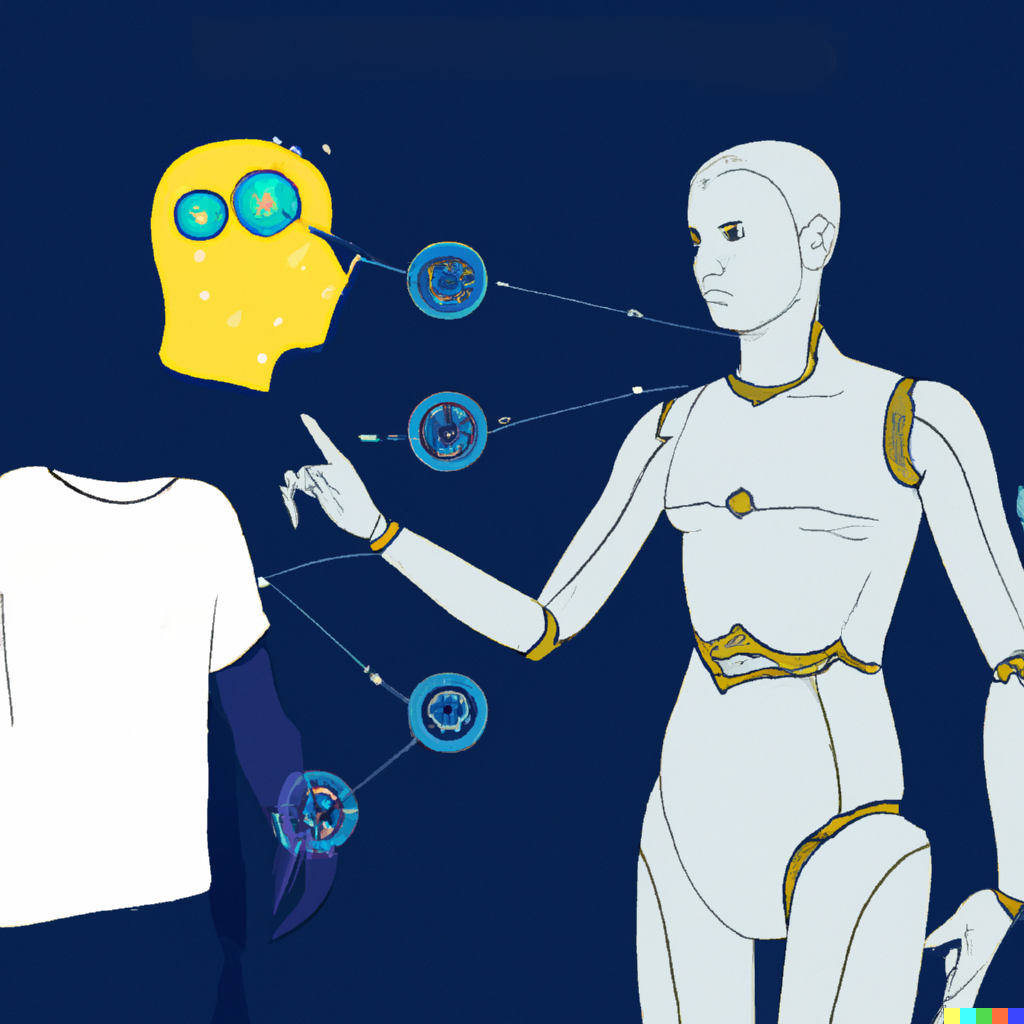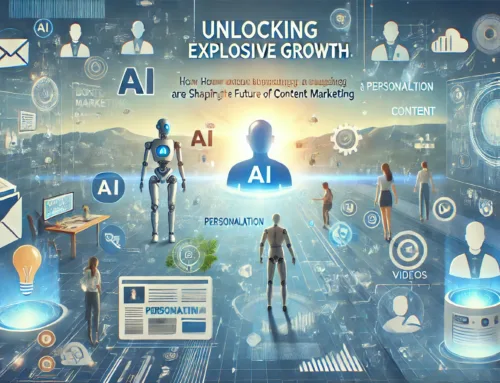Artificial intelligence is changing how marketers approach content strategy. In fact, according to research, an increasing number of B2C companies now use AI to generate, personalize and optimize content. This shift is due to the fact that AI content optimization tools are able to understand the context and provide relevant information based on what people are searching for. So, rather than simply focusing on keywords and writing content around those terms, content creators must focus on the topics that matter to consumers.
The next step in this process is to write content that provides authoritative answers to questions that customers might ask themselves while researching products online. For example, if someone searches for “best headphones,” you don’t want to just list off every headphone brand out there; you want to show up in the answer section because you’re providing a solution to the question.
In addition to answering customer queries, AI technology helps marketers build trust with audiences by creating authentic content. By understanding the language and tone of voice used in social media posts, AI software can identify whether or not something is genuine. If it detects that a piece of content is spammy or fake, it won’t rank well in search engines. Instead, it’ll push that post down in favor of real, trustworthy content.
So, while AI is making content creation easier, marketers still need to know how to optimize their AI-generated content for search. They need to make sure that their content is optimized for humans first and also for machines.
What is AI (Artificial Intelligence)?
 The term artificial intelligence refers to machines that are able to perform tasks normally associated with human intelligence. In fact, it’s a broad term that covers many different types of machine learning algorithms and software programs. Some examples include voice recognition systems, computer vision systems, natural language processing tools, and even self-driving cars. While there are many definitions of artificial intelligence out there, here are some common ones:
The term artificial intelligence refers to machines that are able to perform tasks normally associated with human intelligence. In fact, it’s a broad term that covers many different types of machine learning algorithms and software programs. Some examples include voice recognition systems, computer vision systems, natural language processing tools, and even self-driving cars. While there are many definitions of artificial intelligence out there, here are some common ones:
• “An intelligent agent that perceives its environment and takes actions to maximize its chances of success.”
• “A system that simulates human cognitive processes such as perception, memory, reasoning, problem-solving, planning, and decision making.”
• “Intelligence is the ability to acquire knowledge, solve problems, and adapt accordingly.”
• “AI is a field of study that focuses on creating intelligent machines that work alongside people rather than replacing them.”
• “The science of building computers capable of performing complex tasks usually requiring human expertise.”
• “The branch of computer science concerned with designing intelligent agents.”
What Is Content Optimization?
Content optimization is an integral part of any successful marketing strategy. It helps ensure that your content gets found by people searching online. If you don’t optimize your content properly, chances are good that it won’t show up in search results. In fact, according to Banklinko – the #1 organic result is 10x more likely to receive a click compared to a page in the #10 spot.
There are many different types of content, such as text, video, audio, graphics, and even social media posts. Each type of content requires a slightly different approach to optimizing it. For example, you’ll need to use keywords differently depending on what type of content you’re creating. You might add certain keywords to photos, while others could go into the description field. Keywords are used to describe the main topic of your content. They help search engines understand what your webpage is about.
You can find out how much traffic your site receives each day by logging into Google Analytics. This tool allows you to see where visitors come from, how long they spend on your site, and what actions they take once they arrive. You can also track conversions, like sales or leads generated.
Once you’ve optimized your content, you’ll want to make sure that it’s relevant to your target audience. Users are likely to click away from irrelevant content. To do this, you’ll need to know who your potential customers are. Consider asking yourself questions like “Who am I trying to reach?” or “How does my product/service benefit them?” Once you know who you’re targeting, you can craft your messaging appropriately.
The best way to determine whether or not your content is engaging enough is to ask yourself some questions. Are people reading your blog post? Do they feel compelled to keep scrolling down your page? How often are they clicking on your calls to action? These are all signs that your content is doing its job.
Why Does Content Optimization Matter?
 Content decay happens naturally. Over time, older content becomes less relevant because it doesn’t match up with current trends. If you’re trying to rank well for a specific keyword, and your content is over 12 months old, chances are that your content is out of date. This isn’t necessarily a bad thing. However, if you don’t keep your content updated, you’ll start losing traffic to competitors who do.
Content decay happens naturally. Over time, older content becomes less relevant because it doesn’t match up with current trends. If you’re trying to rank well for a specific keyword, and your content is over 12 months old, chances are that your content is out of date. This isn’t necessarily a bad thing. However, if you don’t keep your content updated, you’ll start losing traffic to competitors who do.
There are many ways to optimize content. You can use social media, guest posts, paid ads, etc., to promote your content. But there’s one surefire way to ensure that your content stays optimized: Create an ongoing content audit process and a strategy.
A content audit will allow you to identify areas of improvement(age of content, topic coverage, ranking, visitor engagement) and create a plan to address those issues. The goal here is to improve your overall content quality so that it ranks higher in search engines.
If you’re looking to get started with SEO, we recommend trying SEMrush. With their free trial, you can test multiple keywords and compare your rankings against other websites.
If you know what your audience wants, you can write content that matches those needs. For example, you could write about how to fix a broken appliance or how to cook a certain dish. Your audience might be looking for information about how to repair a washing machine or how to bake cupcakes. By writing about topics that your audience cares about, you increase the likelihood that they’ll read your article.
You can even use this technique to find keywords. If you notice that most of your competition is writing about cooking recipes, you can try writing about how to clean a stovetop. You’ll still be covering a topic that your audience cares about—cleaning a stovetop—but now you’ll be able to target a different set of keywords.
How AI is affecting SEO?
AI is changing the way we do things, whether it’s helping us make better decisions or automating tedious tasks. In the world of SEO, artificial intelligence (AI) is being used to improve our ability to rank well. From keyword research to content creation, there are many ways AI can help us outrank competitors.
Keyword research is one of the most important parts of optimizing a site. There are several different types of AI that can help us find keywords, including Natural Language Processing, Machine Learning, Deep Learning, and Sentiment Analysis. These techniques allow us to learn about what people are searching for and how they are expressing themselves online.
We can use this information to discover new opportunities and develop strategies to increase traffic. For example, KeywordInsights assists with keyword research, keyword clustering, and AI-driven content brief generation.
Full long-form content generation is another area where AI can help us outsmart the competition. By leveraging AI, we can automate repetitive tasks, such as creating blog posts or updating social media profiles. This saves us time and allows us to focus on more important aspects of SEO.
The final step in optimizing a site is improving the performance of individual elements. With AI, we can analyze each element of a page and determine how it affects rankings. For example, we can check the impact of meta descriptions, headers, images, videos, and more. Using data collected from millions of searches, we can identify trends and patterns that lead to successful SEO campaigns.
Using AI SEO Tools
 A lot of people are looking for ways to improve their online presence. They want to rank high on search engines like Google and Bing. But it’s hard to do without knowing how to go about it. There are many tools out there that claim to make things easier, but some of them are just scams.
A lot of people are looking for ways to improve their online presence. They want to rank high on search engines like Google and Bing. But it’s hard to do without knowing how to go about it. There are many tools out there that claim to make things easier, but some of them are just scams.
That’s why we recommend that you try an AI SEO tool. It will help you create and optimize your site better. An AI SEO tool is software that uses artificial intelligence to analyze your website and suggest changes related to topic coverage, keywords website performance, and other ranking factors that will improve your rankings. Several of these programs provide free trial versions.
Our top choices for AI SEO tools include:
Surfer SEO
SurfSEO is an excellent tool for writing content that ranks well in search engines. It helps you to determine which keywords to use when writing new content, and also gives you the ability to perform web audits to help you optimize your site’s SEO.
Frase.io
Frase is an AI-powered platform for creating and collaborating on high-quality, well-researched articles. It helps you quickly create and share compelling, accurate, and engaging copy. You can also use it to collaboratively write and edit long-form documents.
SEMrush
SEMrush is an all-in-one SEO toolkit that helps you research keyword phrases, monitor your rankings, and analyze competitor links. It has a fast backlinks crawler, which means you can keep up with your linking efforts.
Now, you might ask yourself: How do I know whether my site needs improving? Or maybe you already know what you need to do, but you still want to check it out. In either case, here are five reasons why you should consider trying an AI SEO tool:
1. You Can Test Your Keywords Before Buying One
Most AI SEO software packages allow you to test your own keywords. So, you can see whether they work well or not. For example, you could type in your keyword into the box and see whether it ranks well. If it doesn’t, you can change it and rerun the test.
2. You Don’t Need Any Technical Knowledge To Use Them
If you’re thinking about buying an AI SEO software package, you shouldn’t worry about any technical knowledge. Most of them are very easy to use. Just follow the instructions and you won’t have any problems.
3. They Are Easy To Set Up And Manage
You don’t need to be a tech expert to set up an AI SEO software. All you need to do is download the software onto your computer and run it. The rest is done automatically by the program itself.
4. They Save Time
It takes hours to manually optimize your site. That’s because you have to write articles, create backlinks, etc. However, with AI SEO software, all this is taken care of for you.
5. They Help You Get Better Results
When you buy AI SEO software, you get access to a database full of information. This means that you can find out which keywords perform best and which ones don’t.
Once you learn how to use an AI SEO tool, it will become much easier to manage your site. Plus, you’ll save time and money.
AI-Driven Content Creation
Writing text content has changed dramatically over the past few months. No longer do writers need to handcraft pages, blogs, and other forms of written material. Today, with GPT-3 and other related NLP tools AI-powered software can take care of most of the competitive research, keyword discovery, and copy creation, leaving us to focus on what we love doing best – creating valuable useful content! The sections below discuss how AI technology can assist in completing entire documents, creating page titles and meta tags, writing feature lists, and much more.
Content creation and optimization can be much easier with artificial intelligence (AI). In fact, some AI tools can do it for you. You just feed the tools with ideas about what works best for your industry and what doesn’t work well. Then, the tool generates the first draft or even optimized content for you.
In addition to generating the content, AI can analyze text and reword sentences or paragraphs to fit within a specific theme. For example, you could use AI to write articles based on how people talk about your product. Or, you could use AI for image captioning. This way, you don’t have to spend hours creating captions manually. Instead, you can let AI do it for you.
Ten ways AI helps speed up content creation and optimization
1. Generate titles, descriptions, tags, and other elements of an Article Automatically
There are many different types of content out there. Some examples include blog posts, eBooks, infographics, videos, webpages, etc. Each type of content requires unique information. If you want to rank for certain keywords, you’ll need unique content for each keyword. However, most content creators still rely on human editors to create content. But, with AI, you can automate those tasks.
For example, you can tell AI to generate titles, descriptions, and tags for your content. These elements of an article determine whether or not someone reads it. So, if you’re trying to increase traffic to your site, having relevant content is key. And, since AI does the grunt work for you, you won’t have to worry about writing great headlines and descriptions.
2. Analyze Text and Rewrite Sentences or Paragraphs to Fit Within a Specific Theme
If you’re looking to improve your website’s conversion rate, then you should know that people read less than 10% of any given webpage. That means that 90% of the words on a webpage aren’t being read by anyone.
So, why would you waste all that space? Because when people read, they skim through the content. They scan for keywords and phrases that catch their attention. And, if they find something interesting, they click on it.
So, if you want to get people to read your content, you need to make sure that it’s easy to understand. And, one way to make it easier to read is to cut down on the amount of text. By using AI, you can rewrite sentences or paragraphs so that they’re shorter and easier to digest.
3. Create Feature Lists
Feature lists help users decide which products to buy. They also help businesses decide which features to highlight on their websites.
But, creating a good feature list isn’t as simple as it sounds. It takes time and effort to research each item and come up with a compelling description. With AI, you can automate this process.
You can ask AI to create a feature list for you. The tool will look at your competitors’ feature lists and suggest items that you might want to add.
You can also ask AI to create a list of features for your business. Once again, the tool will look at your competition and suggest items that you may want to add.
4. Generate Outlines and Briefs with AI
Outlines are a great way to organize your ideas into coherent chunks of text. They’re especially useful when you want to write about a topic that requires research or writing skills such as academic papers, reports, thesis, etc.
Most AI SEO tools include features to assist with content research and brief creation.
5. SEO content research
Amusing that content marketing teams continue to grow, it will become increasingly difficult to find the time to write compelling copy. In fact, according to HubSpot, 80% of businesses say they struggle to come up with creative content ideas. So what do you do?
Well, you could hire writers, but that’s expensive. Or you could use artificial intelligence (AI), but most people don’t know where to start. Luckily, there are some great resources out there that can help you find inspiration for your next piece of content.
6. Sentence completions using AI write
The sentence completion feature is now being used by many companies to generate content. This technology allows you to quickly create text without having to type every word manually. You just select what you want to say and the program does the rest.
Using Outranking, one can easily create different output levels by simply clicking a button. For example, you could set up three buttons: “Low”, “Medium”, and “High”. Each one would produce a different level of quality.
When generating content through AI, the system will take into account the contextual information from the previous sentences. So, if you are writing about something related to sports, the next sentence might contain words like football, soccer, basketball, etc., depending on the topic.
6. Answering Questions using AI
AI can create listicles, step-by-step, and other formats to improve SEO. AI can also generate answers for questions asked by People Also Ask Boxes (PAAs). And it can even create detailed step-by-step instructions for SEO content.
Use an online booking tool like Travelocity or Booking.com. Search for hotels that offer free breakfasts or Wi-Fi. These might be worth spending money on.
Look for properties that offer amenities such as free breakfast or Wi-Fi. They could be worth paying extra for – especially if you plan on traveling often.
7. Paraphrasing text using AI
There are many tools available online to help you rewrite text using artificial intelligence (AI). These tools use machine learning algorithms to analyze text and determine how it can be improved. You don’t even have to write anything; just give the tool some sample text and let it work out what needs improving.
These tools are great because they can take care of the tedious parts of rewriting while you focus on creating quality content. But there are a few things to keep in mind.
First, make sure you’re actually getting a better copy. If you’re simply copying someone else’s content word for word, you won’t see much improvement. Second, make sure you’re writing unique content. Don’t try to reuse old ideas. Third, make sure you’re providing value. People aren’t interested in reading about your product or service unless it provides something useful. Finally, make sure you’re not plagiarizing. Make sure you’ve got permission to use the content you want to paraphrase.
8. Text translation using AI
AI is being used to translate text into different languages. This is useful because people often speak multiple languages. For example, someone living in Germany might want to read about the United States. If he/she speaks English, French, German and Spanish, there’s a good chance he/she wants to read about the US in one language. But how do we know what language to choose?
One option is to ask a human translator. However, humans aren’t always reliable. They don’t always understand the nuances of a particular word or phrase. Another option is to use machine learning algorithms. These programs analyze large amounts of data and learn from it. Once trained, they can perform tasks much better than humans. In fact, some researchers believe that AI could outperform humans in certain areas such as chess and Go.
To make sure that the translation is correct, you should provide the AI with pieces of information at a given time. For instance, if you want to translate “The United States,” you should tell the program that it needs to translate “The United States.” You shouldn’t just say “USA.” This is because the AI doesn’t know whether you mean “the USA” or “USA.” So, you must specify the exact name of the entity that you’re talking about.
9. Use AI To Identify Topically Important Keywords
Keywords are one of the most important factors in determining where your site appears in search engines. This is why it’s essential to use keyword research tools like Moz Pro and Ahrefs to find out which words people are typing into the search bar. Once you know what those keywords are, you can start building your paragraphs around them.
The best way to do this is to write about the topic in depth. Include relevant information and examples in each section. Make sure to include key phrases throughout the text. You want to make sure that the keywords show up in the body copy itself, as well as in the meta description and URL.
You don’t necessarily need to repeat the exact phrase over and over again. Instead, try to use synonyms and variations of the same word. For example, if you’re selling shoes, you could say something like “shoes, shoes, sandals, slippers, flip flops, etc.”
When writing content, remember to keep things short and sweet. Longer passages tend to push down shorter ones. Keep your paragraphs under 2,500 characters. If you go beyond 3,000 characters, you risk losing some of your ranking power.
10. Extract statistics using AI for improved content and SEO
In this tutorial, we’ll show you how to use AI to extract information about your articles. We’ll explain what it does, why it works, and how to set up the system.
We’ll start by explaining how to install our AI software. Then, we’ll go over how to train the AI to learn what words mean, and how to import data into the program. Finally, we’ll show you some examples of how to use AI to analyze text.
SEO Analytics and AI
 The rise of artificial intelligence (AI) has been one of the most exciting developments in technology in recent years. In fact, it’s hard to imagine how we could live without it now. From self-driving cars to facial recognition software, AI is everywhere. And while there is still much work to do, it seems like every day brings us closer to achieving our dreams of living in a world where machines take care of everything. One area where AI is making big strides is in the realm of SEO — specifically, in the field of SEO analytics.
The rise of artificial intelligence (AI) has been one of the most exciting developments in technology in recent years. In fact, it’s hard to imagine how we could live without it now. From self-driving cars to facial recognition software, AI is everywhere. And while there is still much work to do, it seems like every day brings us closer to achieving our dreams of living in a world where machines take care of everything. One area where AI is making big strides is in the realm of SEO — specifically, in the field of SEO analytics.
Analytics is the process of gathering information about a particular topic and using that information to make decisions. Analytics is used to collect data about your site traffic and use that information to improve your site performance. For example, you might want to know what kinds of queries bring visitors to your site, how long those visits last, and whether certain types of content attract more attention.
In the case of SEO, analytics provides insights into the way people interact with your site. With this information, you can see what works well, what doesn’t, and how you can optimize your efforts moving forward.
One of the biggest challenges faced by SEO professionals today is getting accurate data. While many tools exist to monitor some aspects of your site’s health, they don’t always give you a complete picture. Even worse, some tools require you to manually enter data, which makes it difficult to keep up with changes in your site’s behavior.
That’s why SEO experts turn to AI. By analyzing large amounts of data automatically, AI can provide insights into your site’s performance that human analysts simply couldn’t achieve. As a result, you can spend less time managing your site and more time focusing on improving your content.
While the term analytics conjures images of complex mathematical equations, AI actually does quite a lot of simple tasks quickly.
FAQs
How Can AI help with SEO and Content Marketing?
AI is making big strides in the world of content marketing. This is especially true when it comes to performing data analysis, which is one of the most important aspects of creating quality content. In addition to being able to analyze content, AI can do much more. Here are some examples of what we could accomplish with AI:
1. Create Content – A lot of people think about writing content as a chore. However, there are many ways to use AI to make the process easier. For instance, you can write content based on keywords that are relevant to your audience. You can even automate the whole thing by asking AI to generate content for you.
2. Analyze Data – Data is everything when it comes to content marketing. If you want to know what works well, you need to collect data. While humans can take hours to gather data, AI can do it in seconds. Once you have collected the data, you can use AI to analyze it.
3. Rank Pages – Another way that AI helps us rank better is by analyzing our competitors’ rankings. We can see what types of content work well on certain sites and adjust accordingly.
4. Optimize Keywords – When you optimize your keywords, you are essentially optimizing your site for specific queries. By doing this, you increase the chances of showing up in the search results. With AI, we can easily find out what keywords are working well and focus on those.
5. Improve User Experience – One of the biggest problems with content marketing today is that people don’t read it. They skim over it without understanding what it says. Using AI, we can make sure that our content is engaging enough that readers actually want to learn more about it.
6. Automate Social Media Posts – There are many social media platforms that allow you to post automatically. Instead of wasting time trying to figure out how to do this manually, we can let AI handle it for us.
How to use AI to extract statistics for SEO content
AI can be used to extract statistical data like keywords, sentiment analysis, etc., from a piece of text. This can help you understand how people are searching for certain topics online. You can even use statistics to make better decisions about your content.
For example, let’s say you want to write a blog post about the best places to watch movies in New York City. You could find out that most people looking for this topic tend to search for movie theaters, so you might decide to list some local theaters near where you live. Or maybe you notice that many people search for things like “best movie theater,” so you might want to add a section called “Best Movie Theater.”
You can also look up the average number of words per sentence, the total number of sentences, and the percentage of each word type. If you see that there are lots of nouns and verbs, you know you need to focus on writing long-form content. On the other hand, if you see that there are a lot of adjectives, you know you need more actionable tips.
How to use AI content optimization tools to improve your content creation strategy?
The best way to start creating great content is to make sure you know how to use the AI SEO content tools already in place.
1. Semantic Content Audit
A semantic content audit analyzes your site structure and identifies the most important topics across your website. This helps you identify where your content needs improvement. For example, if you notice that there are many duplicates or irrelevant pages, you might want to rework your navigation menu.
2. Topic Modeling
Topic modeling is a powerful tool that can help you discover hidden patterns within your data. You can use topic models to find out which keywords people are searching for and which types of content they’re looking for. Using topic modeling, you can learn more about your customers’ interests and determine which topics you should focus on.
3. Machine Learning
Machine learning allows you to automate tasks that require human judgment. If you’ve ever used image recognition software, machine learning is similar. Instead of having humans manually label images, machines can do it automatically. With machine learning, you can build algorithms that recognize certain objects or behaviors, such as identifying whether a photo contains a dog or cat.
In Conclusion – AI can help you write faster and scale your organic traffic
In conclusion, AI content optimization is a powerful process that allows you to create high-quality content that ranks highly in search engines. This means that you can attract organic traffic from Google and other major search engines. In fact, we found that all of our clients have seen their organic traffic increase after implementing AI content optimization.
Content creation is changing. Writers now spend less time crafting articles and more time curating content. They are able to produce high-quality content in much shorter periods of time. This change is due to AI, according to a recent report from Searchmetrics.
AI is making writing easier and quicker. In fact, some people say that AI has already replaced most writers. With the help of AI, writers can focus on what matters – creating and optimizing content for human readers.
This type of SEO strategy has become increasingly important because it helps you rank higher than competitors who aren’t using these techniques. So, if you want to improve your rankings, you need to investigate AI content optimization today!





